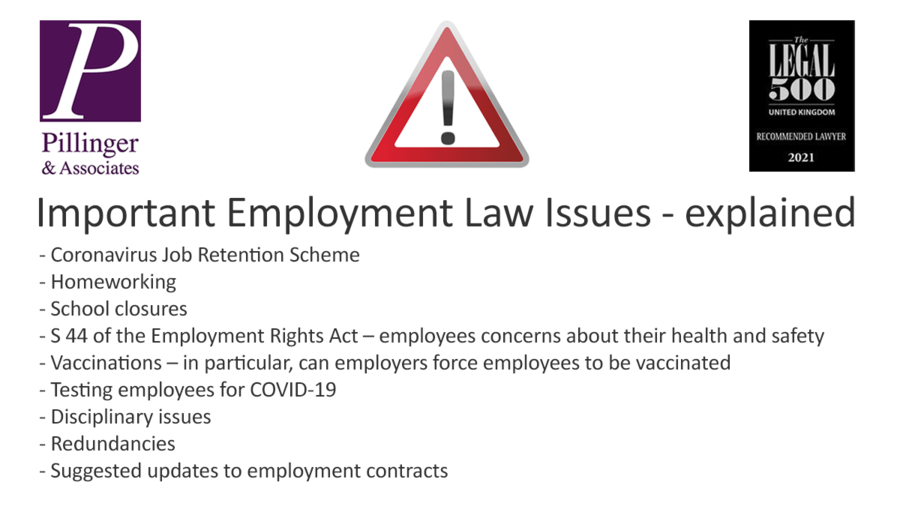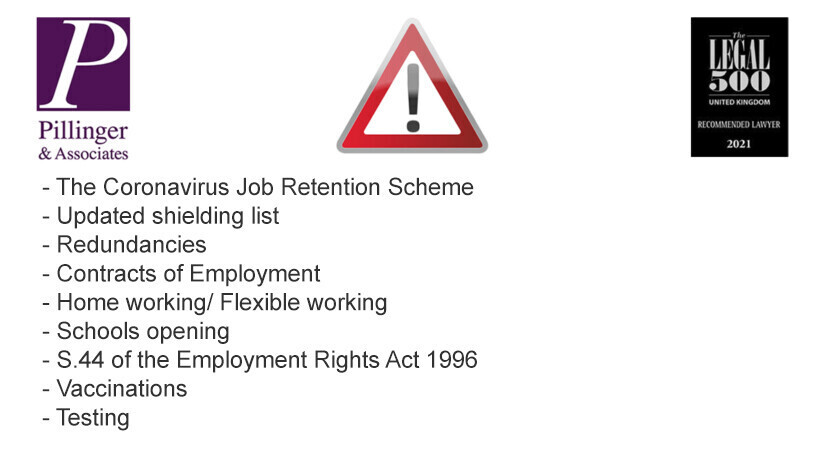
I'm adding this on behalf of Amanda Pillinger, a well respected local employment solicitor, who has been consistently helping people and adding useful information all through the pandemic.
Summary Of Relevant Employment Law Issues – Jan 2021
Given the almost daily announcements, I thought it would be useful to provide a summary of relevant employment law issues. This is a long post so, for ease, I confirm that the following subjects are covered:-
- Coronavirus Job Retention Scheme
- Homeworking
- School closures
- S 44 of the Employment Rights Act – where employees refuse to attend work due to concerns about their health and safety
- Vaccinations – in particular, can employers force employees to be vaccinated
- Testing employees for COVID-19
- Disciplinary issues
- Redundancies
- Suggested updates to employment contracts
Coronavirus Job Retention Scheme
The CJRS has been extended to the end of April 2021 and the Chancellor confirmed that the government will continue to pay 80% towards wages of unworked hours, up to a maximum of £2,500. Employers remain responsible for paying pension contributions and National Insurance contributions. Rishi Sunak has hinted that it may be extended again, but I will let you know as soon as there is confirmation of any extension.
The guidance setting out which employees are eligible to be furloughed is being regularly updated. The link to the most recent version is Check which employees you can put on furlough to use the Coronavirus Job Retention Scheme – GOV.UK (www.gov.uk)
Key points are:-
- Full-time, part-time, agency, flexible and zero-hour employees are all eligible, provided that the reason they cannot work is covid-19 related
- Any employees who are extremely clinically vulnerable and have been advised to shield are eligible
- Employees who are unable to work, including from home, due to caring responsibilities arising from coronavirus, such as caring for children who are at home as a result of school and childcare facilities closing, or caring for a vulnerable individual in their household are eligible
- Employers can claim for employees who were employed on 30 October 2020, as long as they have made a PAYE Real Time Information (RTI) submission to HMRC between 20 March 2020 and 30 October 2020. This applies even where the employer has not previously claimed under the scheme.
- From 1st December 2020, employees are not eligible to be furloughed during any period of statutory or contractual notice
- Furlough is not to be used to cover periods of pre-booked holiday where the employees would otherwise be in work
The guidance is unclear on whether employees who are on sick leave or self-isolating because of COVID-19 are entitled to be furloughed. It has always been the case that such employees are eligible for SSP from day 1 (without the usual 3 day waiting period). The most recent guidance now states that “If you’re on sick leave or self-isolating because of coronavirus, you may want to speak to your employer about whether you are eligible for the Coronavirus Job Retention Scheme (furlough). You may be eligible for Statutory Sick Pay (SSP) while you are on sick leave or self-isolating. If you are put on furlough while on sick leave or self-isolating, you will no longer get sick pay but should be treated as any other furloughed employee.” The wording is contradictory and confusing. Given that this would be quite a fundamental change to the scheme and given there has been no announcement, I believe that the position remains that employees who are sick or self-isolating because of COVID-19 are entitled to SSP only.
Homeworking
Given the new lockdown provisions, people should only leave their home for work if they cannot reasonably work from home. This is a marked change from previous tier 3 advice which stated “To help contain the virus, everyone who can work effectively from home should do so.”
Over recent weeks, many of my clients instructed employees to return to the workplace on the basis that they were unable to work effectively during the first lockdown. Reduced productivity was a common problem. These employers are no longer able to rely on reduced productivity to justify a requirement to remain in the workplace. Employers will need to be able to establish the more onerous position that employees cannot reasonably work from home.
School closures
As stated above, provided they meet other eligibility criteria, parents will be eligible for furlough if they are unable to work due to childcare responsibilities.
Most of my clients are taking a flexible approach. Flexible furlough arrangements can be put in place and amended working hours can assist in some cases.
S 44 of the Employment Rights Act
As I have previously advised, where an employee refuses to attend work in circumstances where they reasonably believe there is a serious and imminent danger to their health and safety, they must not be subject to detrimental treatment. As such, if you have any employees who are unable to work from home but are refusing to attend the workplace due to concerns about H&S, you should not subject them to any detrimental treatment. This will include taking disciplinary action against them or downgrading attendance figures in the context of a redundancy selection process.
There is much debate on whether employees refusing to attend work in these circumstances are entitled to be paid or not. I still believe that the appropriate response is to withhold pay.
In the first instance, provided the employer has followed all government guidance in making the workplace Covid secure, and provided the employee has no specific reason for refusing to attend work (such as being more susceptible or vulnerable to the virus), we would argue that it was not reasonable for the employee to believe there was a serious and imminent danger to their health and safety. If we are able to succeed on this point, the employees will not be protected from detrimental treatment.
In any event, by withholding pay, one of the following scenarios will occur:-
- the employee would return to work;
- the employee would remain off work and would be unpaid (and other employees would not be encouraged to raise similar concerns in the expectation of getting paid time off work);
- the employee would remain off work and would be unpaid, but would submit a claim for unlawful deduction from wages – it is unlikely that such a claim would be considered by the tribunal within the next 12 months. In the event that the claim is successful, the employer would be ordered to reimburse deducted wages so would be no worse off than they would have been had they paid the employee in the first place. In addition, cash flow may be in a stronger position that time; or
- the employee would resign, claiming constructive dismissal – again, it is unlikely that such a claim would be considered by the tribunal for at least 12 months. As such, in the current economic climate, the employee would risk being without salary or compensation for a significant period – this in itself is likely to be a deterrent to employees considering this option. Provided there was no discrimination, the maximum value of the claim would be 12 months’ salary plus a basic award equal to the statutory redundancy entitlement. The employee would also be required to mitigate their loss by trying to find alternative employment. Any income from a new job would be deducted from the value of the claim. The cost to the employer of one constructive dismissal claim may therefore still be less than the cost of paying full salary for other employees jumping on the bandwagon in the event that employees refusing to attend work receive full pay.
If you have any employees refusing to attend work, please contact me so I will be able to advise on the specific circumstances. I am aware of a number of “s.44 letters” circulating online so I am expecting a few to appear.
Vaccinations
Given the fact that vaccinations are now being rolled out across the country, I have been asked whether employers can insist on employees being vaccinated against COVID-19. I have heard of employers telling employees that they will be dismissed if they refuse to be vaccinated.
Employers dismissing employees for refusing to be vaccinated are at risk of a number of claims.
- Disability discrimination where the vaccine could be dangerous to an individual because of a disability
- Religious discrimination where the vaccination may contain products that would offend religious laws
- Unfair dismissal where the employee establishes that the reason for the dismissal was unreasonable and unjustified. This may be due to:-
- Employees genuinely not trusting safety of the vaccine (this is different to an anti-vaxer who is against the whole principle of a vaccination)
- Alleged breach of the Human Rights Act
- Employees being at risk of an adverse reaction
- Pregnant employees being advised not to have the vaccination.
I believe that it will be difficult for most employers to establish that the requirement for all employees to be vaccinated is reasonable and that dismissal is a reasonable response to refusal.
That said, where employees work in the NHS or care sector, employers will find it easier to justify a requirement for all employees to be vaccinated, due to the fact that they need to reduce the risk of staff passing the virus to vulnerable patients and residents. In order to strengthen any defence to claims of unfair dismissal, these employers would need to prove that there were no other suitable roles for the employee. They would also need to talk to the individual employees to see if it was possible to address any of their specific concerns, perhaps by obtaining another version of the vaccination. If you would like more information about this, please review the following video Can your employer dismiss you if you refuse the coronavirus vaccine? – YouTube
Unfortunately, this is a matter that will ultimately be determined in the Employment Tribunal as it is inevitable that a claim of unfair dismissal will be made by someone. It is currently taking over 12 months for claims to be determined. This delay may deter potential claimants who may prefer to retain their job in the current economic climate!
On a practical note, I would suggest that employers speak to employees who are refusing to be vaccinated to see if it is possible to address their concerns. In addition, consideration could be given to moving them to alternative roles where the risk of exposure is lower.
Finally, provided there is no potential discrimination, employees with less than 2 years’ service will not be eligible to make a claim for unfair dismissal so the risk of a claim is far lower in these cases.
Please contact me for further advice before taking any action against employees refusing to be vaccinated.
COVID-19 testing
The government have issued guidance to employers who wish to introduce testing for employees. The guidance can be found at Coronavirus (COVID-19) testing: guidance for employers and third-party healthcare providers – GOV.UK (www.gov.uk)
In particular, it confirms that before deciding to establish a testing programme, employers are advised that they are clear on:
- who the testing will cover – for example, whether this is all directly employed staff, or includes individuals working onsite, like contractors
- what the focus of the programme is: staff with symptoms or without symptoms
- how often staff will be tested
- the appropriate facilities for carrying out the tests
- which test should be used (to be clear, virus tests are designed to detect active infection whereas antibody tests only reveal evidence of previous infection)
- what the arrangements will be for any individual who does not wish to be tested
- how the employer will use test results, including its policies on matters like handling health information, absence from work, self-isolation, diversity, non-discrimination, and so on
- the compatibility of the programme with its legal responsibilities to staff including under health and safety, equalities, data protection and employment law
- how, and by who, the legal duty to report test results to Public Health England (PHE) will be carried out
- the affordability of implementing a testing programme
I believe that employers will have stronger cases for insisting on testing for employees, given that no substance will be inserted into the body. In addition, I believe that employers will be able to justify the requirement to test those who are still in the workplace, on the basis that a large proportion of people who test positive are asymptomatic. Asymptomatic people can still pass the virus to others, so testing allows you to have more control over the workplace and to protect other employees.
Employees may be reluctant to agree to be tested as they may be concerned that, if they test positive they will be required to self-isolate and will only receive SSP. This is an issue that you should therefore consider. Could your employees work from home or would you consider temporary enhanced sick pay to protect the workforce?
Disciplinary issues
Unbelievably, a few clients have contacted me in circumstances where an employee has attended work where they or a member of their household have recently tested positive for COVID-19. I believe that everyone now knows of the requirement to self-isolate. Indeed, specific instructions will have been included in the communication confirming the test result. As such, I am confident that it is reasonable to take disciplinary action against such employees for a serious breach of health and safety.
Employees are legally required to notify their employer if they, or a member of their household, have tested positive for COVID-19. They are also required to notify their employer if they have been contacted by test and trace and advised to self-isolate. Failure to do so is an offence.
Clearly, some employees will be worried about the financial implications of having to self-isolate, as the entitlement is for SSP only, but it is vital that everyone complies with the requirements.
Redundancy
In some cases, despite the support offered to businesses through the furlough scheme and available grants, redundancy may be the only option. I am hearing of cases where the cost of pension and NI contributions is not sustainable. There are also cases where employers know that they will have a reduced requirement for employees, even after the pandemic.
If your business needs to make redundancies, the first thing to consider is whether you have employees with less than 2 years’ service. Provided any decision to terminate their employment is not discriminatory or made because they whistle blew or asserted a statutory right, such employees will not have a claim for unfair dismissal. Their employment can be terminated by giving them their contractual notice entitlement or by making a payment in lieu. Importantly, even if they are currently furloughed, they will not be eligible for furlough during any contractual or statutory notice period.
For all other employees, a proper consultation process should take place. There is no relaxation of the requirements to follow a fair and reasonable process in consulting with employees about redundancy so the usual procedures should be followed. Where 20 or more employees are at risk of redundancy, collective consultation must take place and there are minimum consultation periods, depending on the numbers of employees involved.
Please contact me if you require any assistance or advice regarding redundancy or alternatives to redundancy.
Suggested changes to contract of employment
All my clients are aware that up to date contracts of employment can protect a business. Given recent experiences, I would suggest that contracts are updated to include the following:-
- a clause entitling the employer to lay off employees or introduce short time working
- a clause making it a condition of employment that all employees in certain roles (other than those with genuine medical conditions where this is not possible) are vaccinated against COVID and that the vaccinations are up to date
- a clause to address homeworking and any additional requirements on employees
Please let me know if you would like me to review your contracts and add appropriate provisions.
I hope that this assists. Again, I apologise for the length of this post but I thought it would be useful to provide clarification on these common concerns. As always, please do not hesitate to contact me if you have any queries or require any additional advice.
Amanda Pillinger
amanda@pillingerandassociates.co.uk
Reproduced with permission and the original post can be seen here: Pillinger and Associates

